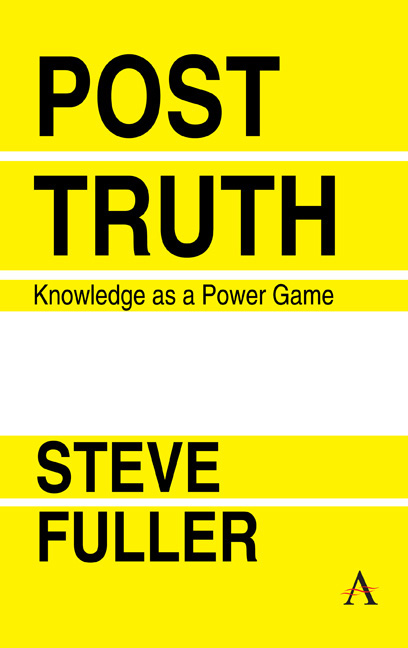Book contents
- Frontmatter
- Dedication
- Contents
- Acknowledgements
- Introduction: Science and Politics in a Post-Truth Era: Pareto's Hidden Hand
- 1 Brexit: Political Expertise Confronts the Will of the People
- 2 What Philosophy Does and Does Not Teach Us about the Post-Truth Condition
- 3 Sociology and Science and Technology Studies as Post-Truth Sciences
- 4 The Post-Truth about Academia: Undiscovered Public Knowledge
- 5 Science Customization: A Project for the Post-Truth Condition
- 6 The Performance of Politics and Science on the Playing Field of Time
- 7 Forecasting: The Future as the Post-Truth Playground
- The Argument in a Nutshell
- Glossary
- References
- Index
1 - Brexit: Political Expertise Confronts the Will of the People
Published online by Cambridge University Press: 14 July 2018
- Frontmatter
- Dedication
- Contents
- Acknowledgements
- Introduction: Science and Politics in a Post-Truth Era: Pareto's Hidden Hand
- 1 Brexit: Political Expertise Confronts the Will of the People
- 2 What Philosophy Does and Does Not Teach Us about the Post-Truth Condition
- 3 Sociology and Science and Technology Studies as Post-Truth Sciences
- 4 The Post-Truth about Academia: Undiscovered Public Knowledge
- 5 Science Customization: A Project for the Post-Truth Condition
- 6 The Performance of Politics and Science on the Playing Field of Time
- 7 Forecasting: The Future as the Post-Truth Playground
- The Argument in a Nutshell
- Glossary
- References
- Index
Summary
Introduction
I should start by saying that I would be happy to reverse the course which the United Kingdom has taken since that fateful 52/ 48 decision on 23 June 2016 to exit the EU after more than 40 years of membership (hence ‘Brexit’). Any path that would lead the United Kingdom back to the EU is fine with me: a parliamentary vote, another general election, a second referendum – you name it. But suppose Brexit is inevitable. My view then is that we should examine more closely – and even more charitably – what some of the more ‘visionary’ Brexiteers have been projecting. However, this is not as easy as it first sounds because their vision is a strange amalgam of populism and elitism, which when taken together threatens not only the sovereignty of Parliament, which has been much discussed in the media, but also the authority of expertise more generally. Such are the ways of the fox, in Pareto's terms. Here it is worth recalling that virtually all of UK academia, business leaders – including the Bank of England – and world politicians who expressed an opinion wanted to see the United Kingdom remain in the EU. (Russia was a notable exception.)
However, as we shall see, Brexit has turned out to be a poisoned chalice for the Brexiteers, who had not anticipated that the public would treat its newfound voice as though it were a sort of collectively manifested expertise of its own. I present the argument that follows in three parts. First, I consider Brexit in relation to my own long- standing anti- expertist approach to social epistemology, which in many ways makes me a kindred spirit to the Brexiteers. Next, I turn to the struggle of parliamentary elites which eventuated in the win for Brexit, focusing on the Brexiteers’ distinctive epistemic and ethical strategy with regard to public opinion. Finally, I consider the unforeseen emergence of a Rousseau- style ‘general will’ with regard to Brexit, which is where British democracy stands for the foreseeable future, ending on the role of academia – and specifically business schools – in the anti- expert revolution.
- Type
- Chapter
- Information
- Post-TruthKnowledge as a Power Game, pp. 9 - 24Publisher: Anthem PressPrint publication year: 2018

